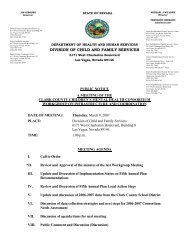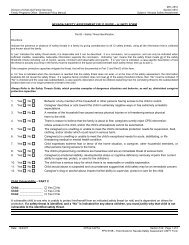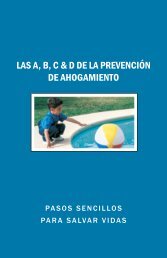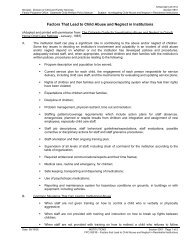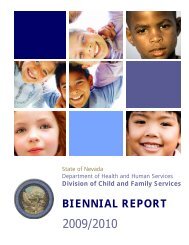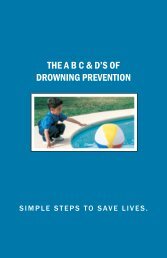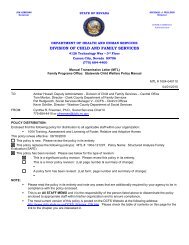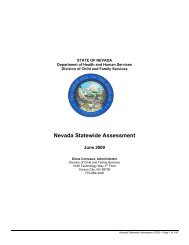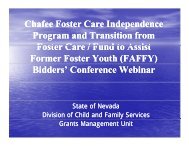STATE OF NEVADA - Division of Child and Family Services
STATE OF NEVADA - Division of Child and Family Services
STATE OF NEVADA - Division of Child and Family Services
You also want an ePaper? Increase the reach of your titles
YUMPU automatically turns print PDFs into web optimized ePapers that Google loves.
• Emphasize the use <strong>of</strong> data as a critical <strong>and</strong> meaningful resource for all stakeholders in defining jurisdictional needs,<br />
identifying resources that positively impact outcomes for children <strong>and</strong> families, <strong>and</strong> planning for the allocation <strong>of</strong><br />
personnel <strong>and</strong> other resources.<br />
CIP as well as DCFS continue to share common goals related to safety, permanency, <strong>and</strong> well being as well as the lack <strong>of</strong><br />
legal counsel. <strong>Child</strong> abuse <strong>and</strong> neglect issues are one <strong>of</strong> the Court’s highest priorities for the previous years. Focus for the<br />
next couple <strong>of</strong> years will be on placement stability, permanency, <strong>and</strong> adoptions. There were areas needing improvement<br />
in the CFSR that the court has a direct role in affecting improvement. Issues requiring a collaborative approach are<br />
discussed <strong>and</strong> items <strong>of</strong> mutual concern are identified.<br />
There are several ongoing CIP initiatives supported by this program. The first centers around the Interstate Compact on<br />
the Placement <strong>of</strong> <strong>Child</strong>ren (ICPC). Based on the 2008 Nevada State ICPC Assessment <strong>and</strong> best practices identified from<br />
sister states, activities in CIP’s Strategic Plans were revised in January 2009. Benchmarks include evaluating <strong>and</strong><br />
developing web-based training for judges <strong>and</strong> DCFS on the effective use <strong>of</strong> ICPC, <strong>and</strong> thereafter incorporating into<br />
regularly provided trainings for social workers, attorneys, judges, providers, CASA volunteers, <strong>and</strong> foster parents<br />
beginning with the evaluation in July 2010 <strong>and</strong> the development <strong>of</strong> web-based training in December 2010. This training is<br />
designed to assist stakeholders in underst<strong>and</strong>ing the complexities <strong>of</strong> the Interstate Compact on the Placement <strong>of</strong><br />
<strong>Child</strong>ren. The National Resource Center has provided technical assistance to CIP as well as DCFS by conducting on-site<br />
visits, interviewing staff, reviewing files, protocols <strong>and</strong> <strong>of</strong> state law <strong>and</strong> regulations to identify legal <strong>and</strong> practical barriers<br />
that might prevent timely judicial decision making determine methods to expedite ICPC cases.<br />
A second initiative supported by CIP includes efforts related to the collaborative $3.7 million methamphetamine grant.<br />
CIP collaborated with the State in submitting a proposal on a Target Grant to Increase the Well-Being <strong>and</strong> Permanency<br />
Outcomes for, <strong>Child</strong>ren Affected by Methamphetamine or Substance Abuse. Specific strategies to support the expansion<br />
<strong>of</strong> the family drug court program in the Eighth Judicial District Court were also included. The State <strong>of</strong> Nevada DCFS <strong>of</strong><br />
<strong>Child</strong> & <strong>Family</strong> <strong>Services</strong> (DCFS) as the lead agency, sought funding in the total amount <strong>of</strong> $3,742,000.00 under Program<br />
Option 2 ($1,000,000 annual award for 5 years – Declining Federal Award) with the following partners: the Nevada<br />
Attorney General’s Office (AG); Nevada’s Court Improvement Project (CIP); CCDFS Drug Dependency Court, Nevada’s<br />
Substance Abuse Prevention <strong>and</strong> Treatment Agency (SAPTA); CCDFS Department <strong>of</strong> <strong>Family</strong> <strong>Services</strong> (CCDFS), nonstate<br />
entity, <strong>and</strong> WestCare Foundation (CCDFS non-pr<strong>of</strong>it community provider) to address methamphetamine abuse <strong>and</strong><br />
its impact on child welfare in CCDFS Nevada. More information on this initiative is presented in Item 35: Service Array.<br />
A third initiative supported by CIP is the <strong>Child</strong>’s Attorneys Project (CAP) Pro Bono Lawyer <strong>and</strong> Surrogate Education<br />
Advocacy program. The Grantee for this program is the Legal Aid Center <strong>of</strong> Southern Nevada. The purpose <strong>of</strong> this<br />
project is tw<strong>of</strong>old: (1) to assist Legal Aid Center <strong>of</strong> Southern Nevada (LACSN) in providing representation for abused <strong>and</strong><br />
neglected children by enhancing recruitment <strong>and</strong> training for the volunteer lawyers; <strong>and</strong> (2) to assist LACSN in providing<br />
educational surrogates, pursuant to the Individuals with Disabilities Educational Act (IDEA), 20 USC Section 1415<br />
(b)(2)(A), by enhancing recruitment <strong>and</strong> training <strong>of</strong> volunteers. The LACSN Pro Bono Project recruits <strong>and</strong> trains private<br />
lawyers to represent child victims <strong>of</strong> abuse <strong>and</strong> neglect. LACSN provides CLE, training manuals, <strong>and</strong> bi-monthly support<br />
luncheons for volunteers. Additionally, an LACSN CAP Staff Attorney is assigned as a mentor on each case. The Pro<br />
Bono Project met its stated goal <strong>of</strong> recruiting <strong>and</strong> training more lawyers to represent these children. During the first year <strong>of</strong><br />
the grant, 103 new CAP cases were assigned to pro bono volunteers, which are up significantly from the 64 cases that<br />
were placed during the same period a year earlier. Additionally, 29 <strong>of</strong> the new volunteers recruited to the Project during<br />
the grant period got involved to take CAP cases. This is triple the 10 new volunteers recruited to the Project who accepted<br />
CAP cases during the same period a year earlier. Approximately 25 attorneys attended the 3-hour CLE training programs<br />
LACSN <strong>of</strong>fered on "Representing <strong>Child</strong> Victims <strong>of</strong> Abuse <strong>and</strong> Neglect" in both October <strong>and</strong> May. In the year prior to the<br />
grant period, LACSN only <strong>of</strong>fered one such training <strong>and</strong> taught about 13 volunteers.<br />
The biggest barrier faced by this Project is providing an attorney for every child. At the present time, attorneys are<br />
assisting approximately one-third <strong>of</strong> the children in the dependency system. Because the courts are convinced that an<br />
attorney for a child makes a difference in the outcome, i.e., quicker resolution <strong>of</strong> the case or expedited services for the<br />
child, the Court is referring more children to LACSN than it can h<strong>and</strong>le. LACSN is attempting to secure additional funding<br />
for staff attorneys <strong>and</strong> additional pro bono attorneys to assist. Second year funding was provided to LACSN for calendar<br />
year 2010.<br />
The LACSN Educational Surrogate Program recruits <strong>and</strong> trains volunteers who will act on behalf <strong>of</strong> the children living in<br />
group homes or institutional settings, advocating when necessary, with regard to special education services. In addition to<br />
running the Educational Surrogate Program, the LACSN Special Education Program provides support <strong>and</strong> assistance<br />
regarding special education issues to CAP Staff Attorneys <strong>and</strong> CAP Pro Bono Volunteers. DFS <strong>and</strong> DCFS social workers,<br />
Nevada APSR – SFY 2010<br />
Page 72 <strong>of</strong> 108



